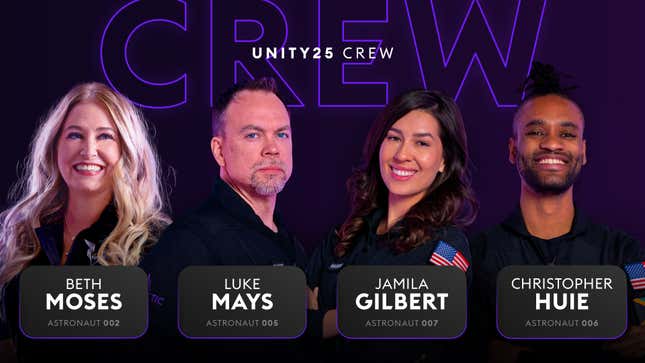Private crewed space flights were so hot in 2021 and 2022, but the current year has been very quiet in this regard. That’s now about to change, as Axiom Space and Virgin Galactic prepare for their respective space-based missions, both scheduled for late May.
A SpaceX Falcon 9 carrying a crew of four to the International Space Station is set to launch no earlier than Sunday, May 21 from Kennedy Space Center in Florida. NASA Space Operations posted this news to Twitter on May 3, just two days after announcing that Axiom Mission 2, or Ax-2, would not fly in early May.
Advertisement
Once on the ISS, the Ax-2 crew consisting of commander Peggy Whitson, pilot John Shoffner, and mission specialists Ali Algarni and Rayyanah Barnawi will spend a dozen days performing science and technology experiments, as the private company prepares to build its own orbital space station, known as Axiom Station. Saudi astronauts Algarni and Barnawi secured their seats on the mission through an agreement between Axiom Space and Saudi Arabia.
The first Axiom mission to the ISS, Ax-1, launched in April 2022 but ran into unexpected challenges that led to new NASA policies, including the requirement that a NASA astronaut be part of the crew. Accordingly, Whitson, a former NASA astronaut and current Axiom Space director of human spaceflight, will lead this orbital mission.
Advertisement

Also ahead is the pending launch of Virgin Galactic’s Unity 25 mission to suborbital space. The Richard Branson-founded company made the announcement in an emailed May 8 press release but did not provide a firm date and time for the mission, except for saying it’ll happen in late May.
Advertisement
Virgin Galactic is not to be confused with Virgin Orbit, the latter being a satellite-launching company that declared bankruptcy in early April. Virgin Galactic, on the other hand, is in the business of sending space tourists on quick trips to suborbital space aboard spaceplanes.
Unity 25 will serve as a fully functional test flight, as the Virgin Galactic crew performs its “final assessment” of the reconfigured platform, according to the press release. The carrier aircraft, VMS Eve, resumed flights in February after a 16-month pause to implement a modified version of the four-point launch pylon used to carry and deploy the VSS Unity spaceplane. A successful glide test with Unity in late April set the stage for May’s launch attempt. Should the planned demonstration go well, Virgin Galactic could resume commercial space tourism flights in late June, according to the company.
Advertisement
“Returning to space is what we have all worked towards. Our mission specialists were selected for their diverse expertise, and they couldn’t be better suited to validate the astronaut training program and overall experience,” explained Mike Moses, president of Virgin Galactic’s Spaceline Missions and Safety. “After this flight we will begin flying our customers to space.”
Those mission specialists include astronaut instructors Beth Moses and Luke Mays, and mission specialists Jamila Gilbert and Christopher Huie. Operating VSS Unity will be commander Mike Masucci and pilot CJ Sturckow.
Advertisement
Should all go as planned, Unity 25 will be the 25th flight of the spaceplane and its fifth trek to suborbital space, typically an altitude of around 55.3 miles (89 kilometers). Virgin Galactic has performed just one fully crewed suborbital flight with Unity—the flight that included Richard Branson—which took place on July 11, 2021. Nitpickers will justifiably argue that Unity doesn’t actually reach space, as the Kármán line—the international boundary of space—begins roughly 62 miles (100 km) above the surface. Regardless, the spaceplane will perform its reentry after reaching apogee, followed by a gentle glide that will take it back to the runway at Spaceport America in New Mexico.
We’re still waiting for a resumption of Blue Origin’s New Shepard suborbital rocket, which the Federal Aviation Administration grounded last year after a failed uncrewed flight. A recent investigation identified a “thermo-structural failure of the engine nozzle” as the reason for the anomaly, which created an explosion when New Shepard was 29,000 feet (8,840 meters) above the ground. The Jeff Bezos-owned company hasn’t offered a specific date for when Blue Origin can resume its space tourism flights, aside from saying it’ll happen “soon.” The most recent crewed suborbital flight of New Shepard, the NS-22 mission, took place on August 4, 2022.
Advertisement
Aside from Virgin Galactic and Blue Origin, there is also SpaceX’s space tourism venture to consider, and again, there’s been a bit of a lag. SpaceX’s first private spaceflight with only private citizens aboard, Inspiration 4, blasted off on September 16, 2021 for a three-day mission in Earth orbit. The successor mission, Polaris Dawn, is planned for later this year.
For more spaceflight in your life, follow us on Twitter and bookmark Gizmodo’s dedicated Spaceflight page.
Services Marketplace – Listings, Bookings & Reviews